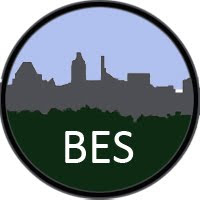Rebooting our Warming Cities
A Hopkins-led team says better climate modeling and data can help Baltimore weather a hotter, stormier future. Read the full article here.
This author has not written his bio yet.
But we are proud to say that Maribeth Rubenstein contributed 43 entries already.
A Hopkins-led team says better climate modeling and data can help Baltimore weather a hotter, stormier future. Read the full article here.
Green stormwater infrastructure has long been cast as a win-win in big cities. But a recent line of research suggests that underprivileged communities are far less likely to see it. […]
The U.S. Department of Energy (DoE) is funding three Urban Integrated Field Laboratories including the new Baltimore Social-Environmental Collaborative (BSEC). According to the DoE, Urban Integrated Field Laboratories (Urban IFLs) […]
Listen to The Brian Lehrer Show audio story featuring one of Baltimore Ecosystem Study’s founding researchers, Dr. Charles Nilon. He talks about his research and the intersection of trees and environmental […]
“Although stream restoration filters pollutants out of local waterways and improves the health of the Chesapeake Bay, Baltimore area neighborhoods where it would do the most for water quality are […]
A BES graduate student’s research led to the unveiling of a marker at a Black women’s golfing club that had helped to desegregate Baltimore’s parks and golf courses. From the […]
Cary Institute Distinguished Senior Scientist and BES Founding Director Steward T.A. Pickett with ecologists Lenore Fahrig and Simon Levin have been selected as recipients of the 14th BBVA Foundation Frontiers […]
Green infrastructure can help manage urban hazards, such as flooding, extreme heat, and toxic pollution while improving the availability and quality of urban green space. Across the US, cities have […]
See what the BES LTER Education team has been up to in a new video – ‘Building and Sustaining a PLC in a Virtual World’. Learn how the BES LTER […]
Check out one of BES LTER’s founding researchers, Dr. Morgan Grove, discussing urban ecology, segregation, environmental justice, and the efforts of the US Forest Service’s Baltimore Field Station on the […]
This research was supported by funding from the NSF Long-term Ecological Research (LTER) Program. This material is based upon work supported by the National Science Foundation under Grant Nos. DEB-1637661 and DEB-1855277. Any opinions, findings, and conclusions or recommendations expressed in this material are those of the author(s) and do not necessarily reflect the views of the National Science Foundation.
The Baltimore Ecosystem Study has been a National Science Foundation Long Term Ecological Research (LTER) site since 1998. Visit other LTER sites.
 |
 |
